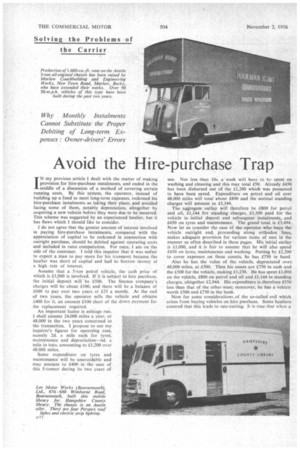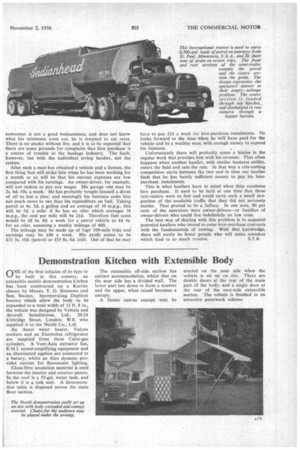Avoid the Hire-purchase Trap
Page 72

Page 79

If you've noticed an error in this article please click here to report it so we can fix it.
Why Monthly Instalments Cannot Substitute the Proper Debiting of Long-term Expenses: Owner-drivers' Errors
IN my previous article .1 dealt with the matter of making provision for hire-purchase instalments, and ended in the middle of a discussion of a method of covering certain running costs. By this system, the operator, instead of building up a fund to meet long-term expenses, reckoned his hire-purchase instalments as taking their place, and avoided facing some of them, notably depreciation, altogether by acquiring a new vehicle before they were due to be incurred. This scheme was suggested by an experienced haulier, but it has flaws which I should like to consider.
1 do not agree that the greater amount of interest involved in paying hire-purchase instalments, compared with the appreciation of capital to be reckoned in connection with outright purchase, should be debited against operating costs and included in rates computation. For once, I am on the side of the customer. I told this inquirer that it was unfair to expect a man to pay more for his transport because the haulier was short of capital and had to borrow money at a high rate of interest.
Assume that a 5-ton petrol vehicle, the cash price of which is £1,000 is involved. If it is subject to hire purchase, the initial deposit will be £500. The finance company's charges will be about £100, and there will be a balance of £600 to pay over two years at £25 a month. At the end of two years, the operator sells the vehicle and obtains £400 for it, an amount £100 short of the down payment for the replacement required. .
An important factor is mileage run. I shall assume 24,000 miles a year, or 48,000 in the two years concerned in the transaction. I propose to use my inquirer's figures for operating cost, namely 2d. a mite each for tyres, maintenance and depreciation-6d. a mile in toto. amounting to £1,200 over 48,000 miles.
Some expenditure on tyres and maintenance will be unavoidable and may amount to 1400 in the case of this 5-tonner during its two years of use. Not less than 10s. a week will have to be spent on washing and cleaning and this may total £50. Already £450 has been disbursed out of the £1,200 which was presumed to have been saved. Expenditure on petrol and oil over 48,000 miles will total about £800 and the normal standing charges will amount to £1,144.
The aggregate outlay will therefore be £800 for petrol and oil, £1,144 for standing charges, £1,100 paid for the vehicle in initial deposit and subsequent instalments, and £450 on tyres and maintenance. The grand total. is 13,494. Now let us consider the case of the operator who buys the vehicle outright and, proceeding along orthodox lines, makes adequate provision for various items of cost in the manner so often described in these pages. His initial outlay is £1,000, and it is fair to assume that he will also spend £450 on tyres, maintenance and washing. Putting by £1,200 to cover expenses on these counts, he has £750 in hand.
Also he has the value of the vehicle, depreciated over. 48,000 miles, at £500. Thus his assets are £750 in cash and the £500 for the vehicle, making £1,250Be has spent £1,000 on the vehicle, £800 on petrol and oil and £1,144 in standing charges, altogether £2,944. His expenditure is therefore £550 less than that of the other man; moreover, he has a vehicle worth £500 and £750 in the bank.
Now for some considerations .of the so-called evil which arises from buying vehicles on hire purchase. Some hauliers contend that this leads to rate-cutting. It is true that when a newcomer is not a good businessman, and does not know what his minimum costs are, he is tempted to cut rates. There is no smoke without fire, and it is to be expected that there are some grounds for complaint that hire purchase is a source of trouble in the haulage industry. The fault, however, lies With the individual erring haulier, not the system.
After such a man has obtained a vehicle and a licence, the first thing that will strike him when he has been working for a month or so will be that his current expenses are low compared with his earnings. An owner-driver, for example, will not reckon to pay any wages. His garage reht may be 2s. 6d.-10s. a week. He has probably bought himself a drum of oil to last a year, and seemingly his business costs him not much more to run than his expenditure on fuel. Taking petrol at 4s. 2d, a gallon and an average of 10 m.p.g., this will be 5d. a mile: if he has an oiler which averages 18 m.p.g., the cost per mile will be 21d. Therefore fuel costs would be £8 6s. 8d. a week for a petrol vehicle or £4 4s. for an oiler, assuming a weekly mileage of 400.
The mileage may be made up of fox 100-mile trips and earnings may be £40 a week, His profit seems to be £31 5s. 10d. (petrol) or £35 8s. 6d. (oil). Out of that he may have to pay £10 a week for hire-purchase instalments. He looks forward to the time when he will have paid for the vehicle and be a wealthy man, with enough money to expand his business.
Unfortunately there will probably come a hiatus in the regular work that provides him with his revenue. That often happens when another haulier, with similar business ability, enters the field and cuts the rate. In that way a rate-cutting competition starts between the two and in time our haulier finds that he has barely sufficient money to pay his hirepurchase instalments.
This is what hauliers have in mind when they condemn hire purchase. It used to be held at one time that these rate-cutters were so few and could carry such a small proportion of the available traffic that they did not seriously matter. That proved to be a fallacy. In one area, 80 per cent. of the operators were owner-drivers—or families of owner-drivers who could live indefinitely on low rates.
The best way of dealing with this problem is to acquaint potential hauliers who intend to enter hire-purchase contracts with the fundamentals of costing. With that knowledge, there will surely be fewer people who will make mistakes
which lead to so much trouble. S.T. R
















































































































